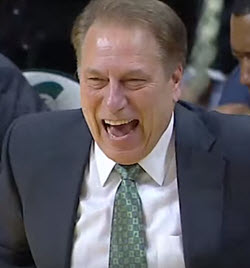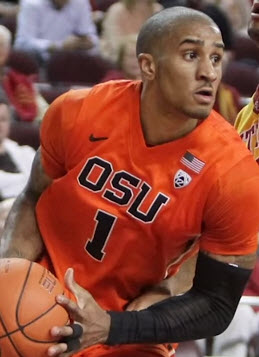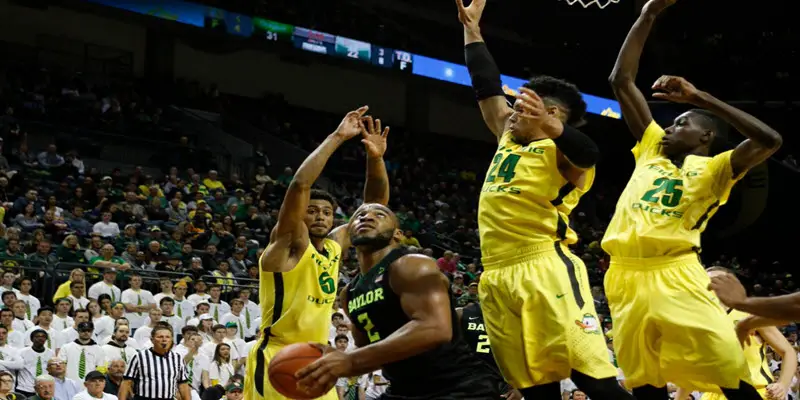Perhaps Tulsa should not be in the field? Perhaps Monmouth, South Carolina, St. Bonnies and St. Mary’s should be in? But it’s not as if any team left out is a true threat to be cutting down the nets in Houston. And it is hard to feel sorry for ‘mid-major’ conference regular season champions left out because they did not also win their respective conference tournament. If you want the champ to be in, then do not play a post-season tourney and in 3 to 4 days destroy a season-long effort. (And I wonder how many of the smaller conferences earn a net profit at the tourney’s end?) [Editor applauding as he reads this.]
But I do have a minor concern. Is it really necessary to send schools hither and yon rather than having schools that qualify for the field play in their logical geographic setting? Should Arizona and its fans have to travel from Tucson to Providence, Rhode Island? Should Philadelphia’s Saint Joseph’s and the Hawks fans have to fly all the way to Spokane? If playoff game location was based on geography there certainly could be the season when one or two regions contained an inequitable number of highly-ranked teams.
However, using geography to place teams could result in a number of early round games between conference foes. When you consider the cost of fan travel, meals and lodging for the early games that are often played far from home, keeping teams in their own locale would be far more friendly to the people who, besides the players, should count the most – the fans. (And it would also be kinder to the players.)
So, in 2016, what would the field look like if the participants stayed in their own region? And would the regions be reasonably balanced?
[For this purpose of this exercise, I eliminated seeds 65 through 68 to have a field of 64 without the Tuesday/Wednesday play-in nonsense. I then placed the 64 seeds in their respective natural geographic bracket. With a few minor exceptions as noted below, I also used the order in which teams were seeded by the basketball seeding committee in the ‘real brackets’ to seed the teams.]MIDWEST
1) KANSAS vs.16) GREEN BAY

Tom Izzo (MSU) before he saw this bracket …
8) WISCONSIN vs 9) DAYTON
2) MICHIGAN ST. vs 15) NO. IOWA
7) NOTRE DAME vs 10) IOWA
3) XAVIER vs 14) WICHITA ST
6) PURDUE vs 11) BUTLER
4) IOWA ST. vs 13) MICHIGAN
5) INDIANA vs 12) CINCINNATI
This would be a very strong region with a prospective Sweet 16 of Kansas vs Iowa St. and Michigan St. vs Xavier. Two Big 12 teams meeting in the Sweet 16 is not optimal, but Indiana would be a very tough out for the Cyclones. That this would be a deep, strong bracket is evidenced by a very talented Northern Iowa squad being seeded 15. (There would be no conference rematches in Round 1)
EAST
1) VILLANOVA vs 16) BUFFALO
8) PROVIDENCE vs 9) UCONN
2) W. VIRGINIA vs 15) IONA
7) SAINT JOE’S vs 10) PITTSBURGH
3) MIAMI vs 14) STONY BROOK
6) SETON HALL vs 11) TEMPLE
4) DUKE vs 13) YALE
5) MARYLAND vs 12) SYRACUSE
Unlike in the ‘real tourney,’ Nova makes it to the “1” line here. This looks to be another strong region with great Sweet 16 match-ups if form holds. Another tough 2 vs 15 match-up with WVa playing Iona. Like the Midwest Region, there are no conference vs conference 1st round games in the East. Nice battle of the ’smart guys’ when the Blue Devils meet up with the Eli in the first round. The ever classy coach K might be grumpy if Duke advanced to play Villanova in Philadelphia, however.
SOUTH
1) UNC vs 16) STEPHEN F. AUSTIN
8) VANDERBILT vs 9) CHATTANOOGA
2) UVa vs 15) HAMPTON
7) VCU vs 10) LITTLE ROCK
3) TEXAS A&M vs 14) AUSTIN PEAY
6) TEXAS vs 11) NORTH CAROLINA WILMINGTON
4) KENTUCKY vs 13) NORTH CAROLINA ASHEVILLE
5) BAYLOR vs 12) MIDDLE TENNESSEE
This region is weaker top to bottom than the Midwest and the East but it is feisty at the top. The potential for a Texas vs Texas A&M match-up exists here as it does in the ‘real tourney.’ North Carolina vs Kentucky would be a battle of the bluest of the blue bloods. Whoa – a second ACC/SEC match-up of UVa vs TAMU would make this an interesting conference vs conference face off in the Sweet 16.
WEST

Can the Beavers make some noise in the tourney?
1) OREGON vs 16) WEBER ST.
8) COLORADO vs 9) GONZAGA
2) OKLAHOMA vs 15) CAL STATE BAKERSFIELD
7) TEXAS TECH vs 10) SOUTHERN CAL
3) UTAH vs 14) TULSA
6) OREGON ST. vs 11) FRESNO ST.
4) CAL vs 13) HAWAII
5) ARIZONA v 12) SOUTH DAKOTA ST.
With the Pac-12 placing 7 teams in the tournament field – it becomes the most incestuous of the regions. I finagled the seeding bagel a bit here switching USC from a 9-seed to a 10- and putting the Zags in the 9-hole to help balance the bracket. I also – and correctly I believe – switched Tulsa to a 14-seed and Fresno St. to an 11-seed to give No. 3-seed Utah an easier first-round opponent. No 1st round conference vs conference match-ups but the 2nd round could be a Pac-12 mini tournament.
All in all, the brackets for each region seem to be fairly well balanced. And some teams, such as Michigan St. ranked No. 2 in the ‘actual’ Midwest region as it is here, would appear to have a tougher road to follow in this faux geography-based bracket than it does in the ‘real tourney.’ My guess is that coach Izzo would prefer facing UVa as currently set up rather than face Kansas, as could happen in the Midwest bracket above. And the fans, including students (what a concept, students actually being able to watch their classmates live), would generally have a far easier and less expensive travel burden than they face now.
The NCAA could even make the tournament more fan friendly and pocket more money by playing Rounds 1 and 2 at the home stadia of the top 4 seeded teams in each region before moving off campus for the Sweet 16. [Editor’s note: “That makes too much sense.”]
Of course, I am likely to be the only person ruminating over this stuff rather than filling out the ‘real brackets.’ But based on my lack of success in prior seasons, this procrastination when it comes to filing out my ‘real brackets’ is well justified.
The Cranky Curmudgeon of FishDuck.com,
Jon Joseph

Jon Joseph grew up in Boston, Massachusetts but has been blessed to have lived long enough in the west to have exorcised all east coast bias. He played football in college and has passionately followed the game for seven decades. A retired corporate attorney Jon has lectured across the country and published numerous articles on banking and gaming law. Now a resident of Aiken South Carolina, Jon follows college football across the nation with a focus on the Conference of Champions and the Ducks.

